- Home
- Madeleine L'engle
Love Letters
Love Letters Read online
EARLY BIRD BOOKS
FRESH EBOOK DEALS, DELIVERED DAILY
BE THE FIRST TO KNOW—
NEW DEALS HATCH EVERY DAY!
The Love Letters
A Novel
Madeleine L’Engle
FOR ALAN
Love is a revolt against the finitude of the finite, the transience of the transient, the relativity of the relative.
George Tyrell
It was an old moon, late in rising, and lopsided, shining wetly through the gathering clouds. Its cold light barely touched Charlotte Napier, sitting hunched into her fur coat on a marble bench; the surrounding pattern of mosaic on the plaza by the Convento de Nossa Senhora da Conceição was lost in shadow. It was three o’clock in the morning in this unknown town of Beja, Portugal: cold, raw, the dead of winter. In New York, so variable a thing is time, it would be barely bedtime, and Patrick, her husband …
What would Patrick be doing? Getting ready for bed as though nothing had happened? as though Charlotte had not fled across an ocean to escape him? Or, rather, to escape not Patrick, but his words:
“Raped you?… A child conceived in hate?… The hell with you. Leave me alone …”
The old moon was dying. Would Patrick notice it between the tall buildings of the city? The death of the moon; the death of a child; the death of a marriage …
She said aloud, “But I didn’t kill him!” and then, silently, clasping her arms about herself as though to contain her anguish,—It wasn’t anybody’s fault, not even mine. It was an accident—
“Mrs. Napier—”
She sat upright, rigid. Had her cry, her private, inviolable grief, been revealed?
“Mrs. Napier.” The voice came again, and with it the young man, Antonio de Tieve, who had sat at the table with her at dinner in the pensão.
She crouched there in silence and looked at him, his silhouette dark against the white walls of the convent. A cloud obscured the moon so that she could not see his features, only the shadow of his face between black hair and black jacket.
“Let me take you back to the pensão,” he said. “It is much too cold for you to be sitting out here. And at this time of night it is not good for you to be out alone.”
At least he did not ask her why she was there, and this was such a relief to her that she did not think to ask him what he himself was doing up and on the convent plaza in the small hours of the morning. Not moving from the marble bench she said, “The pensão is too cold. I couldn’t sleep.”
“I will get you some more covers.”
“No. There are plenty of covers. They’re just heavy …”
He sat down beside her. “I will stay with you, then, until you are ready to go back.”
“No. Please don’t bother. I’m all right.”
“You are in trouble.”
“I’m all right,” she repeated. “When my mother-in-law gets back from Paris tomorrow and I can talk to her …”
“But your mother-in-law didn’t know you were coming. You didn’t let anybody know.”
—Because I didn’t know, she thought.—I hardly knew even when I was on the plane. “I came rather unexpectedly,” she said.
He turned as though to try to make out her features in the darkness; his face came closer to hers, and then he was kissing her, roughly, passionately.
She pulled away and stood up. Her voice cut icily through the cold of the night. “Stop.”
“But I thought you—”
She cut across the words she would not hear. “Go. Now.”
“Mrs. Napier, I am terribly sorry,” he said. “I only want to help.”
“You’re not helping. You’re only proving Patrick was right. Please go. Now.”
He bowed, with precision, turned, and crossed the plaza. He moved with grace, despite the impediment of a slight limp. At dinner he had told her that he had been hurt in a duel while he was a student at the University of Coimbra, “one of the three oldest universities in Europe—did you know that?”
No, Charlotte didn’t.
“We still keep the old traditions, a notch in our gowns for each of our love affairs. Many of our gowns are rather frayed, as you might imagine. And so, of course, we have duels, though these are frowned upon. And fado, you should hear us sing fado.”
Exhausted from the plane trip and lack of sleep, she had not asked him what fado was. She did not want to know; not that, not anything else about him. His very being here in Beja, his presence at her table in the pensão for dinner, his coming to her here at the convent in the middle of the night, were outward and visible signs of the depravity of which Patrick had accused her.
—But wrongly. It is not true. I did not send Andrew to his death. There was nothing between me and Gus, or between me and anybody else, except Patrick.
The moon was lost behind the clouds. A chill, misting rain began to fall. She pulled the collar of her old sealskin coat up about her pale hair. The rain beaded her face, cold, clear, unlike the hot, salt tears which might have helped if only she were still able to cry. But she had not cried for a long time. She could not cry now.
He had been helpful, the young man. That was all she had thought when she saw him in the lobby of the pensão, that he could help. She had arrived at the pensão at dusk after driving from Lisbon in a rented Volkswagen; the door was opened to her by a dark child, a boy, perhaps twelve years old. But all she could see was the blaze of his smile, the dark tangle of lashes shading enormous eyes. Her heart began to thump so painfully that she was hardly aware of his stream of Portuguese, soft sshhs and jjhhs with a few Teutonic chs. He was at least twice as old as Andrew; his hair was black and curly instead of pale silk; there was no real resemblance; it was nothing but fatigue superimposing image upon image.
And there was no way to communicate with this image until the young man came into the lobby, holding a book, his finger marking the place, and, speaking fluent French, asked if he could help. Senhora Vieira, the child’s mother, the proprietress, was out for a few moments.
“I have a reservation, made this morning from Lisbon. I am Mrs. Patrick Napier.”
His smile was almost as brilliant as the grubby Portuguese child’s, as Andrew’s. He switched to English, more heavily accented than his French. “But Mrs. Napier, we’ve been waiting for you! Ever since we heard your name—I stay here at the pensão, too, you see—are you coming because of our glorious Dame Violet?”
Charlotte sighed. Yes, of course she had come because of the glorious Dame Violet; but she could not under any circumstances go crawling to her, though she had crossed the ocean to see her. One did not drop in, unannounced, on Violet Napier; therefore the pensão reservation; even in her present desperation Charlotte would preserve protocol. If Violet was to help her, Charlotte would have to go to her on her own two feet, figuratively as well as literally. Violet had no patience with people who went limp under strain like boiled spaghetti.
“She is my mother-in-law,” she said. “If you would help me put a call through to her—”
The call was as much of a nightmare as the whole flight from New York. Violet was not in Beja. Violet had been in Paris to do a concert and would return the next evening.
Trying not to show shock and disappointment, she let Antonio de Tieve register for her; she let the child take her to her room. She ate dinner, hardly knowing that Antonio was sitting across from her, talking charmingly. After dinner she went immediately to bed and plunged into an exhausted sleep. And slept two hours. Two hours and she was awake and cold and the blankets were only a damp weight on her tired limbs. Around two o’clock she got up and dressed, as she had done so often that winter in New York, and let herself out. She did at least remember to adjust the lock on the door so that she could get back in.
The pensão was on a large square. Directly across the square was a barracks-like building; in the yellow circles of light from the lamps it seemed foreboding, frightening. She remembered a time when she was a small girl and she and her father had been held for several hours in Antwerp, because, for some never explained reason, the customs officer had thought her father’s typewriter was a bomb. When they were finally released, they were down in the Antwerp police records forever as Mr. and Miss Blue-Blonde, the investigating officer having transcribed the color of eyes and hair from the passports in place of their names. There was something about this barracks in Portugal that reminded Charlotte of the one in Belgium and that sent her hurrying in the opposite direction.
She turned up a cobblestoned street with narrow sidewalks that were an intricate design of black and pale-grey mosaic. Mosaic at her feet; the colors luminous in the street lamps; ceramic tile on the white houses to her right and left; everywhere a sense of order, of design. But in Charlotte’s own chaos she was unable to comprehend order, and she found that her sense of smell was less blunted than her sight. The air was sharp not only with impending rain but with the acrid stink of drains and of rancid oil and damp cold; the smell seemed to seep through her coat along with the night wind.
She went along a street of small shops, dark now for the night, so that their windows were blind expanses of glass, turned down a street of private houses, and then saw on her right a great white building gleaming softly in the dark. As she reached the top of the street, she could see a plaque on the corner of the building. She crossed and peered at the lettering in the dim light of the street lamp: CONVENTO DE NOSSA SENHORA DA CONCEIÇÃO. The convent building faced a large mosaic terrace with marble benches and a life-sized statue of a woman. The building was entirely dark. Of course it would be, at this hour of the night—or morning. It would be time for the nuns to be up, soon. Where was the chapel? There would always be a light in the chapel. But she could see no glimmer of light anywhere, could sense only an empty darkness hanging about the convent. Or was she projecting her own desolation on her surroundings?
Beja.
She was in Beja to see Violet Napier, Patrick’s mother, Charlotte’s mother-in-law, who was also Dame Violet Napier the harpsichordist. And it was not for nothing that Violet had been nicknamed the Violent.
—When Violet comes back tomorrow—no, today—and I can talk—
What made her think she could talk to Violet, Violet, of all people, Violet who was Patrick’s mother?
Antonio de Tieve knew Violet, and this was only logical in a small town, not horrid coincidence. What would Violet think of Antonio’s coming to the convent plaza, of his arrogant, blasphemous kiss?
The rain began to fall more heavily. Her pale hair, her coat were soggy. She could not stay here any longer. Would the nuns let her in?
Without thinking she crossed to the arched entrance of the convent. There did not seem to be any bell to the door, so she began to knock. She knocked and no one came, and it was the very lack of response that broke through her unthinking pounding and she withdrew her hand quickly.
If she was this tired, so tired that she could think of trying to rouse the nuns in an unknown convent in the middle of the night—and she was this tired—she might as well accept the fact that she was not thinking coherently, that she was really incapable of thinking at all. She had better return to the pensão and get back into the damp bed that was at least drier than the rain.
But when she had undressed and slid, shivering, under the comfortless weight of blankets, she could not sleep. There had been wine with dinner, and then too much coffee, and alcohol and caffein warred in her blood. She turned on the dim lamp and sat up in bed, her arms circling her knees, and looked around as though seeking reassurance, as though she might see something the room had not revealed before; but no revelation was forthcoming in this dark, chill rectangle, only a foreboding sense of past time, of lost time, of things sought for and not found. Behind her the heavy carved wood of the bedstead loomed up almost to the ceiling; its very massiveness seemed menacing; there was no comfort to be found in the bed, nor in the great, cumbersome wardrobe that matched it. In the spring of the year, with sunlight brightening the dark chintz of the curtains, the spidery pattern of the wallpaper, the room might have seemed full of Old World charm and atmosphere; the feeling of the past pervading the present might have been a delight. In the dead of winter and the small hours of the night, it filled her with a sense of oppression that was suffocating.
She got out of bed and took her coat down from the wardrobe, pushed into it, though it was still matted with rain, and pulled the collar up. The floor was icy under her bare feet. She crouched and opened the door to the night stand: on the bottom shelf was a chamber pot; above it were three books which she pulled out. Despite the inadequate light she would try to read herself to sleep. The first book was a Gideon Bible: even in Beja, Portugal? Essie, her father’s housekeeper, beloved Essie, in all times of stress had reached for her Bible, opened it, and pointed a finger at a verse. There she was supposed to find the answer. Charlotte with the certainty of youth had told Essie that this was superstition if not sin, but, as she thrust the Bible aside now, she wondered:—But suppose it could answer me …
She pulled it back across the covers, opened it, and put her finger down on the page. The psalms. My flesh trembleth for fear of thee; and I am afraid of thy judgments.
—Well, Charlotte, what did you expect? Serves you right.
She turned to the other two books, both paperbound. The first was French, Lettres d’une Réligieuse Portugaise. The second was Portuguese, something about Soror Mariana; another nun, then. There seemed no escaping them, though nuns were not what Charlotte was fleeing from; more likely to:—get thee to a nunnery. (Her father had sent her to convent schools not for religion but to learn manners. Or so he had said.) She opened the Portuguese book and her smattering of Spanish helped her to pick out a few words, but at the end of the page she had made no sense of them, so she turned to the French book. At least it would hold a reasonable safety, because from this distance the years in the convent schools seemed to be haloed with an aura of comfort, if only the comfort of time past, passed through; but at least she had learned what to expect from nuns, so even a Portuguese nun would not offer many surprises, would give a kind of familiar childhood reassurance.
She began leafing through the book at random. You made me completely yours with your violence; it was your love that made mine burst into flame; your tenderness melted me, and then your promises completely reassured me. My own awakening passion undid me, and the result of what started with such happiness is tears, and deathly despair, and I see no help anywhere.
Certainly there was no help here! She sighed. The language of the Religious, particularly the Latin Religious, in describing the reaction of the human to the divine love, frequently makes use of the language of secular love, of sexual love; there was nothing really new or startling here, so Charlotte, cold, tired, groping, read on: It’s true that in loving you I felt a joy I hadn’t known was possible, but I’m paying for it with a pain I didn’t know was possible, either. If I had tried to resist your love, or held back out of false modesty; if I’d let my reason be stronger than my love, then you’d have a right to punish me now, and to use your power over me. But it seemed to me that you loved me even before you told me that you did: you made me believe that yours was a great passion. You carried me away and I gave myself entirely to love …
She sighed again. This stuff was useless as a soporific. When she was twelve she had memorized large quantities of St. John of the Cross, wallowing in a romanticism far from that austere saint’s intention. She still remembered much of it. Closing her eyes, she whispered,
Whither hast thou hidden thyself, and hast left me, O Beloved, to my sighing?
Thou didst flee like the hart, having wounded me: I went out after thee, calling, and thou wert gone.
Sheperds, ye th
at go yonder, through the sheepcotes, to the hill,
If perchance ye see him that I most love, Tell ye him that I languish, suffer and die.
Since thou hast wounded this heart, wherefore didst thou not heal it?
And wherefore, having robbed me of it, hast thou left it thus
And takest not the prey that thou hast spoiled?
Well, St. John of the Cross was not only a great mystic, he was a great poet, which this Portuguese nun was not.
She turned wearily back to the first of the letters. Oh, my darling, if only you had known when you first came to me what was going to happen! Poor love, you betrayed me, and you betrayed yourself by hoping for the impossible. You expected so much joy from our love, and all that is left is the pain of our parting.
She rejected the nun’s letters with the same revulsion with which she had thrown down the Gideon Bible. What kind of answer was this?… the result of what started with such happiness is tears, and deathly despair, and I see no help anywhere …
—What would you have made of that, Essie?
She put the three books down on the night stand, turned out the light, and, still in the damp fur coat, plunged under the covers.
The strange words of the Portuguese nun, the mystical words of St. John of the Cross, the searing words of Patrick whirled in discordant counterpoint in her head. She slid in and out of a half sleep, a steep riddled with dreams that left her exhausted instead of refreshed. As soon as it was daylight she got up and dressed. Her throat felt raw and hot.
As she went down the pink marble stairs she heard a high, clear whistling: Bach: a theme from Bach. Bach, here, in his smelly pensão?
In the cold of the lobby the dark child was sitting behind the table, whistling. He looked up and saw her and the radiance of his smile still whipped across her like a blast of wind. Why was he here, with his strange, dark echo of Andrew? Why was he whistling Bach? Bach belonged to Violet, and she would not see Violet until she had worked through time to evening, when Violet would be back from Paris.

 Love Letters
Love Letters The Summer of the Great-Grandmother
The Summer of the Great-Grandmother A Wrinkle in Time
A Wrinkle in Time The Young Unicorns
The Young Unicorns Two-Part Invention: The Story of a Marriage
Two-Part Invention: The Story of a Marriage The Other Side of the Sun
The Other Side of the Sun A House Like a Lotus
A House Like a Lotus Certain Women
Certain Women Many Waters
Many Waters Camilla
Camilla A Ring of Endless Light
A Ring of Endless Light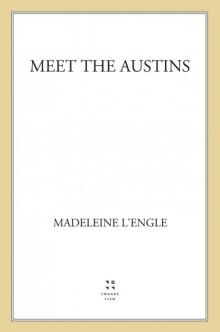 Meet the Austins
Meet the Austins Dragons in the Waters
Dragons in the Waters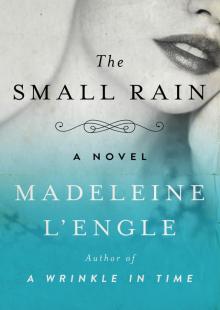 The Small Rain
The Small Rain The Moment of Tenderness
The Moment of Tenderness A Wind in the Door
A Wind in the Door Miracle on 10th Street
Miracle on 10th Street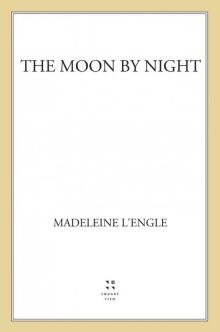 The Moon by Night
The Moon by Night A Swiftly Tilting Planet
A Swiftly Tilting Planet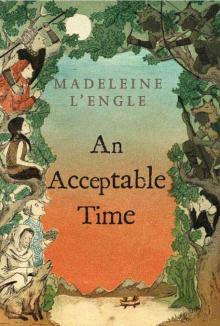 An Acceptable Time
An Acceptable Time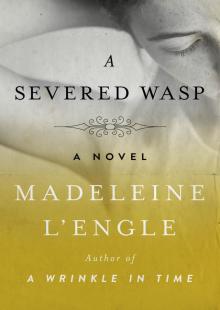 A Severed Wasp
A Severed Wasp The Irrational Season
The Irrational Season A Circle of Quiet
A Circle of Quiet A Live Coal in the Sea
A Live Coal in the Sea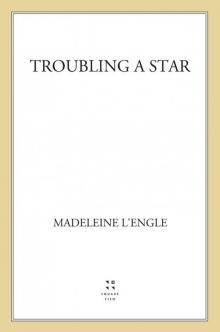 Troubling a Star
Troubling a Star Walking on Water: Reflections on Faith and Art
Walking on Water: Reflections on Faith and Art A Wrinkle in Time Quintet
A Wrinkle in Time Quintet Wrinkle in Time
Wrinkle in Time The Wrinkle in Time Quintet
The Wrinkle in Time Quintet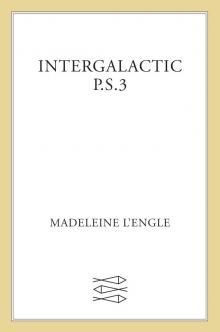 Intergalactic P.S. 3
Intergalactic P.S. 3 Walking on Water
Walking on Water Bright Evening Star
Bright Evening Star The Rock That Is Higher
The Rock That Is Higher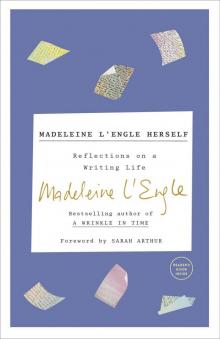 Madeleine L'Engle Herself
Madeleine L'Engle Herself The Arm of the Starfish
The Arm of the Starfish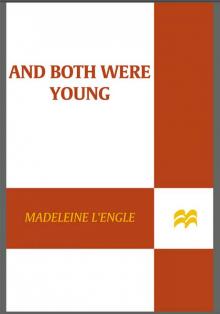 And Both Were Young
And Both Were Young The Twenty-four Days Before Christmas
The Twenty-four Days Before Christmas And It Was Good
And It Was Good A Stone for a Pillow
A Stone for a Pillow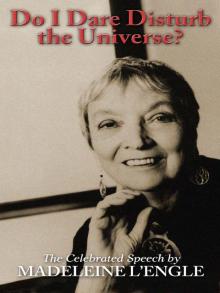 Do I Dare Disturb the Universe?
Do I Dare Disturb the Universe? Sold into Egypt
Sold into Egypt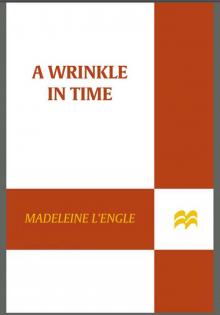 A Wrinkle in Time (Madeleine L'Engle's Time Quintet)
A Wrinkle in Time (Madeleine L'Engle's Time Quintet)